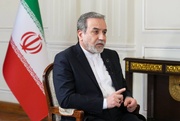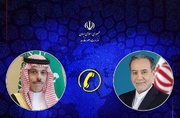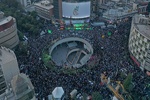“A comprehensive nuclear agreement is within reach,” says Kimball, executive director of the Arms Control Association, a Washington-based advocacy group.
“But,” Kimball says, “Both sides will need to make some tough choices in the coming weeks to reach an agreement by the end of November, particularly on uranium enrichment, which is still a key sticking point in the talks.”
Below is the text of the interview:
Reportedly, US President Barack Obama secretly wrote Iran’s Leader Ayatollah Ali Khamenei in the middle of last month and described a shared interest in fighting ISIL in Iraq and Syria. Can the letter have a positive impact on the nuclear talks between Iran and 5+1 group or help facilitate the diplomatic efforts to reach a nuclear agreement by the Nov. 24 deadline?
It is hard to determine from the outside whether the communications between President Barack Obama and Iran's Leader Ayatollah Ali Khamenei will yield a better understanding and a win-win outcome from the 5+1 talks with Iran.
In general, dialogue between leaders of important nations on key issues is important as it leads to a better understanding of each side’s perspectives. I believe the reported letter from President Obama in October is yet another indication of the United States’ interest reaching a nuclear deal by Nov. 24 that provides Iran with the option to continue to pursue a peaceful nuclear energy program that meets its practical needs, but that also establishes some reasonable limits and additional safeguards to ensure it cannot be used to pursue nuclear weapons.
You have said that you do not believe the interim nuclear deal would be extended again. What are your reasons for this?
Iran and the 5+1 have worked out solutions on several key issues, including some that appeared to be intractable just a year ago. A comprehensive nuclear agreement is within reach, but both sides will need to make some tough choices in the coming weeks to reach an agreement by the end of November, particularly on uranium enrichment, which is still a key sticking point in the talks.
Until now, Iran has opposed reduction of its current enrichment capacity and wants to increase its domestic enrichment over time to provide fuel for additional nuclear power reactors that might be built a decade or more from now. The 5+1, however, want to reduce Iran’s current capacity and base enrichment on Tehran’s current practical needs, which are for the next decade very limited.
There are realistic options available that would meet the bottom line needs of both sides on this key issue. Finding the right combination of measures including curtailing the number of centrifuges for a period of several years, allowing limited research on more sophisticated centrifuges, reducing Iran’s stockpile and form of enriched uranium, and providing Iran with fuel supplies in advance for its one operating light-water power reactor at Bushehr, can meet the core concerns of both sides on this issue.
The two sides can and must reach an agreement on this issue in order to conclude a comprehensive nuclear agreement and/or to demonstrate they have made substantial progress and only needs a few additional weeks to hammer out important technical understandings.
Nuclear negotiators from Iran and the 5+1 group will meet in Muscat, Oman, on November 11 and then will resume talks in Vienna on Nov. 18. So why do the Iranian and 5+1 delegates go to Oman before Vienna?
I don’t know why they chose that particular location, but it is clear that the two sides are effectively in continuous negotiation at some level or another from now until Nov. 24 in order to utilize all the time that is available before the deadline to try to work out an agreement.
Professor Vali Nasr wrote an article recently saying we are in a position that it is the best time to have a nuclear deal with Iran. Or, Saudi Arabia’s intelligence organizations have claimed that Western powers are willing to reach an agreement with Tehran at any price. What is your analysis of the situation? Is it possible that the two sides strike a nuclear deal by Nov. 24?
This is the best time for the 5+1 and Iran to reach a long-term, verifiable comprehensive nuclear agreement because the two sides are close to an agreement on all the issues and both sides are highly motivated to reach agreement. What it will take, in my view, to reach an agreement is further flexibility on each side on two key issues: Iran will need to agree to lower limits on its uranium enrichment capacity for a period of several years; the 5+1 will need to allow some limited research by Iran on advanced centrifuge machines; and the 5+1 will need to find a way to accelerate sanctions relief once and if Iran takes key steps to modify or limit key parts of its nuclear program that could theoretically be used to make nuclear weapons. Neither side, however, is willing to reach an agreement at “any price.”
There have been reports that Obama seeks to lift sanctions on Iran without Congressional permission. Are these reports true?
It should not come as a surprise that during the initial phases of a nuclear deal with Iran, sanctions relief will be granted through presidential waivers, not Congressional action. This means the Obama administration will not seek a Congressional vote on an agreement. Many of the sanctions put in place through laws that originated in Congress provide for presidential waiver authority for national security purposes. Waiving such sanctions in the initial phases of a deal is entirely consistent with what Congress wrote into the legislation in the first place.
On Oct. 17, National Security Council spokeswoman Bernadette Meehan said, “the lifting of sanctions will only come when the IAEA [International Atomic Energy Agency] verifies that Iran has met serious and substantive benchmarks. We must be confident that Iran’s compliance is real and sustainable over a period of time.” Some members of Congress, especially those in the Republican Party, are always looking to find reasons to complain about the president and his policies. They need to understand the legislation they approved was designed to allow the president to exercise his waiver authority on sanctions when Iran meets its obligations according to the terms of a comprehensive nuclear agreement.
Can the mid-term Congressional election, in which the Republicans won the majority in the Senate as well, affect the nuclear talks in case Iran and the 5+1 group fail to reach an agreement by Nov. 24?
I believe it is possible that the nuclear talks may be extended beyond the Nov. 24 target date to resolve remaining technical details on key issues -- as was the case last year after the conclusion of the JPOA. But if the two sides do not reach an agreement in principle by that time on all of the key issues, they must recognize that hardliners in each country may take escalatory actions that narrow the negotiating room in such a way that a long-term deal becomes less likely.
For example, if a comprehensive agreement is not achieved by late November, the US Congress could seek to approve yet another set of sanctions against Iran in the hope that this would coerce Iran’s leaders into an agreement that is more favorable to the West. Such legislation would not be signed by the president into law, but it could trigger Iran to take escalatory steps, including a resumption of uranium enrichment to 20 percent levels of fissionable U-235. These actions, or the threat of such actions, could worsen the climate for negotiations and make it more --not less-- difficult to reach a “win-win” solution on the nuclear issue. Now it is the best time for the two sides to push for and to achieve a comprehensive nuclear agreement.
Some experts argue that it is not possible to reach a comprehensive deal by the Nov. 24 deadline and therefore is it better that Iran and 5+1 group sign a “partial agreement.” How can a partial agreement work?
To my knowledge, the 5+1 and Iran are not working on a “partial” agreement or yet another extension of the 2013 interim agreement (JPOA) but are focused on resolving the remaining issues that would allow them to reach agreement on a Comprehensive Joint Plan of Action by Nov. 24. The interim agreement was only intended to build confidence and time to negotiate a comprehensive agreement. It was intended to halt the further buildup of Iranian nuclear capabilities that could be used to make nuclear weapons in exchange for limited sanctions relief.
It would clearly be better for both sides to reach agreement on a multi-year, comprehensive agreement that addresses international concerns about the nature of Iran’s nuclear program and leads to the removal of the international sanctions that are hurting Iran’s economy.
Interview by: Abdol Hamid Bayati
SH
MNA
END


























Your Comment